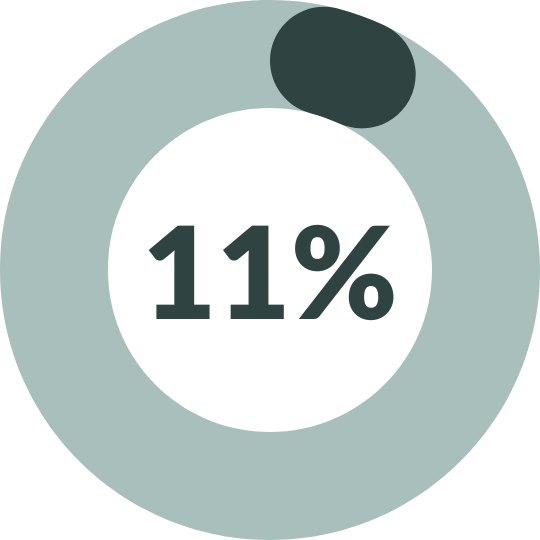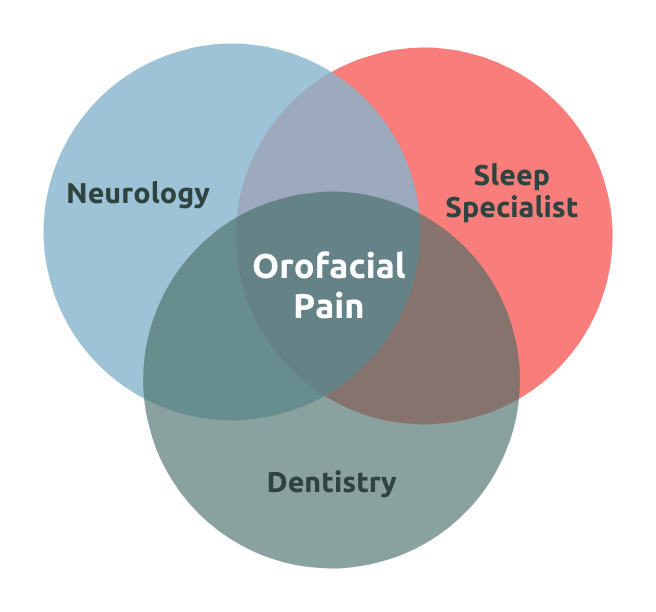Orofacial Pain
What is Orofacial Pain and how it is different than other fields of dentistry and medicine?
An Orofacial Pain specialist is uniquely trained to pinpoint the source of your pain.
No more being passed from provider to provider for your hard-to-diagnose conditions. Midwest Jaw Relief is filling the gap in care by providing patients relief, both physically and emotionally, from their chronic pain.

60% of nerve pain in the face is originally misdiagnosed as tooth pain.

11% of patients with chronic muscle pain first feel symptoms in their teeth.

The average patient sees 3 doctors before finding an OFP specialist.

Orofacial Pain specialists’ training overlaps multiple fields of medicine, making them the ideal providers for chronic pain disorders:
Dentistry: As Doctors of Medicine in Dentistry (DMDs), they have the knowledge to determine if pain is coming from a tooth, a nerve or somewhere deeper.
Neurology: Orofacial Pain Specialists receive advanced training in the neuroanatomy of the face, especially with disorders of the cranial nerves.
Sleep Medicine: They are given advance training in sleep dentistry and are uniquely suited to manage the side effects of sleep appliance therapy.
Psychology: Orofacial Pain Specialists are trained to account for the impact that anxiety, stress, and depression have on chronic pain patients. We will never suggest you are imagining or exaggerating your pain. We will acknowledge the importance of your mental health and wellness in your recovery plan.
Did you know?
- Orofacial Pain (OFP) became an ADA recognized specialty in 2020, making it the 12th specialty in dentistry.
- The term Orofacial Pain is used to describe pain and dysfunction in the head and neck and facial regions.
- There are only a few hundred board-certified OFP providers in the world, making Orofacial Pain a growing but needed field.
“Recognition of this specialty solidifies another link between dentistry and medicine, acknowledging that the orofacial region, oral cavity, and masticatory system are an integral part of total patient care. “
– Gary M. Heir, DMD

OFP Conditions Include:
- Temporomandibular muscle and joint (TMJ) disorders
- Issues with jaw movement
- Chronic headaches and migraines
- Nerve pain in the face, tongue, teeth, or gums
- Burning Mouth Syndrome
- Sleep disorders and sleep apnea
- Pains or sensations such as tinnitus, zapping, or tingling in the head and neck area
“In the large population of symptomatic patients, many have been treated extensively with well-intentioned but ill-advised therapies owing to the lack of recognition of the many OFP disorders.
The typical patient, by the time of referral to an OFP clinician, has exhausted insurance benefits, is disenchanted and suspicious of further treatments; and demonstrates anxiety and depression as well as financial and social distress. “
– Gary M. Heir, DMD
JADA 151(7) | July 2020
FAQs
What does an Orofacial Pain specialist do?
An Orofacial Pain Specialist becomes your point of care provider for diagnosing and treating your chronic pain conditions in the head and neck region. Generally, these treatments are conservative and non-surgical, tailored to the individual rather than using a one-size-fits-all approach.
What conditions do you treat?
We treat jaw pain, nerve pain, headaches, and sleep apnea.
Why haven't I heard of Orofacial Pain before?
Orofacial Pain is a relatively new specialty within dentistry, however, the field itself has been around for over 60 years. Its importance has become recognized in recent years, allowing for awareness to spread to patients and physician communities.
How are you different from a general dentist or ENT doctor?
While both of these providers may receive some training in treating TMJ disorders (TMD) and face pain, an Orofacial Pain specialist has received years of dedicated training exclusively in managing these conditions. Their knowledge overlaps with multiple fields of medicine, making them the ideal providers for chronic pain disorders.
What training does an Orofacial Pain specialist get?
New regulations require all Orofacial Pain Specialists complete:
- A doctorate level degree in dentistry
- An additional 2-3 years in an Orofacial Pain residency program
- Yearly continuing education courses in Facial Pain
To become a board certified diplomat of the ABOP you must pass two additional examinations.
Where can I learn more about this new field?
You can continue your research at the American Academy of Orofacil Pain website as well as our resource page.
See what our specialist can do for you
1.
Book a consultation with our Orofacial Pain specialist
2.
Receive a diagnosis and treatment plan unique to your situation
3.
Enjoy the relief that comes from a knowledgeable doctor who cares


